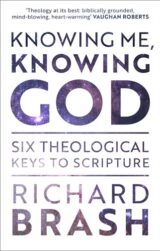Summary
This study focuses on the sixth and final theological key God overcomes sin and makes us his own. It includes discussion of God as the one who acts to save us, and of human beings who are both commanded and enabled to act like God in response. This is the ‘good news’ that corresponds to the ‘bad news’ of the previous study.
Unlike the other keys in KMKG, this one applies in particular to God’s elect, and depends on God’s free grace. It is worked out in the history of special revelation, even though it is planned out in eternity. This means we must refer to chrono-logic, and the biblical story of creation, fall, redemption and restoration, in order fully to account for it.
God is our Saviour. In salvation, by the trinitarian work of Father, Son and Spirit, God overcomes sin, and draws sinners near. Through this salvation, man is restored to full status as beloved sons and heirs of God. As forgiven sinners, we’re then empowered to live in newness of life. We become, ethically, like God, participating in God’s holy nature. In all of this, Jesus is our pioneer and pattern. In him, we are justified and sanctified.
God’s salvation has covenant relationship as its goal. To establish and maintain this relationship, God shows great condescension, pays a great cost, and follows through with great commitment. By his grace in Christ, and by the power of the Holy Spirit, he enables us to make a response befitting his own children, summed up as a life of worship.
Aims of study
- To see how the ‘bad news’ associated with God’s judgment of our sin is the necessary setting for appreciating the ‘good news’ of the gospel.
- To understand the theological key God overcomes sin and makes us his own as planned in eternity, worked out in time, and limited in its application to God’s elect.
- To recognise God as our Saviour, and understand salvation as a trinitarian work of God, in which each Person of God plays his role.
- To view ourselves (if we are believers) as saved creatures, restored to a high status and equipped for a renewed calling: to become like God, ethically.
- To understand Jesus as our pioneer and our pattern in justification and sanctification.
- To be humbled by the great condescension, cost, and commitment associated with God’s acting for our salvation.
- To recognise the centrality of worship in the renewed life of believers, and the ways in which we are called to act like God as his children.
- To distinguish between redemption accomplished and redemption applied, and between Christ’s active and passive righteousness which are both imputed to us.
Starter questions
- Author Philip Yancey writes, ‘Grace means there is nothing we can do to make God love us more… And grace means there is nothing we can do to make God love us less… Grace means that God already loves us as much as an infinite God can possibly love.’ In what sense is Yancey right? Is there another sense in which this is not the whole truth? (See Jude 21, for example.)
Questions to review understanding and for discussion
- What’s so ‘astonishing’ about John Owen’s ‘astonishing dispensation? (p. 125)
- Why do we need the ‘bad news’ in order fully to appreciate the ‘good news’? (p. 126)
- In what ways is the theological key in this chapter/study different from the other keys? (pp. 127-129)
- Why does Brash say that, biblically, salvation is a trinitarian work of God? (p. 131)
- In what different senses can human beings be called ‘children’ of God? (p. 132)
- What is the difference between justification and sanctification? (pp. 133-134) How are these applied to us?
- What was Jesus’ ‘humiliation’? (p. 135) What does Brash mean by the Spirit’s humiliation?
- What is Jesus’ ‘glorification’ (p. 138) and what does it mean for believers today?
Bible passage: 2 Peter 1:1-11
- Brash mentions verse 4 of 2 Peter 1 on p. 133. What does Peter mean when he says that believers ‘become partakers of the divine nature’? If believers have already ‘obtained a faith of equal standing with [Peter’s] by the righteousness of our God and Saviour Jesus Christ’ (v. 1) as evidence that they are called and chosen by God (v.10) why does Peter tell them to ‘make every effort’ (v. 5) and to be ‘all the more diligent’? (v. 10) What do believers have to look forward to? Can they be assured that they will certainly receive these promised blessings? (See also p. 139)
Suggested application questions
- How should believers understand our primary identity, and what impact should that have on how we live? (p. 140)
- What elements of the new life in Christ do you need to prioritise, with the Spirit’s help? (pp. 140-141)
- What are the implications for your daily life of your new status as God’s ‘son’? (p. 141)
- How can we help each other in living out our response to God for – and in – the gift of union with Jesus Christ? (pp. 142-143)
For further study
There are many excellent books on living out the Christian life in the context of the new status that God has given us in Jesus and the indwelling of the Spirit. An excellent start would be Sinclair Ferguson’s In Christ Alone: Living the Gospel-Centered Life (Sanford: Reformation Trust Publishing, 2007).


